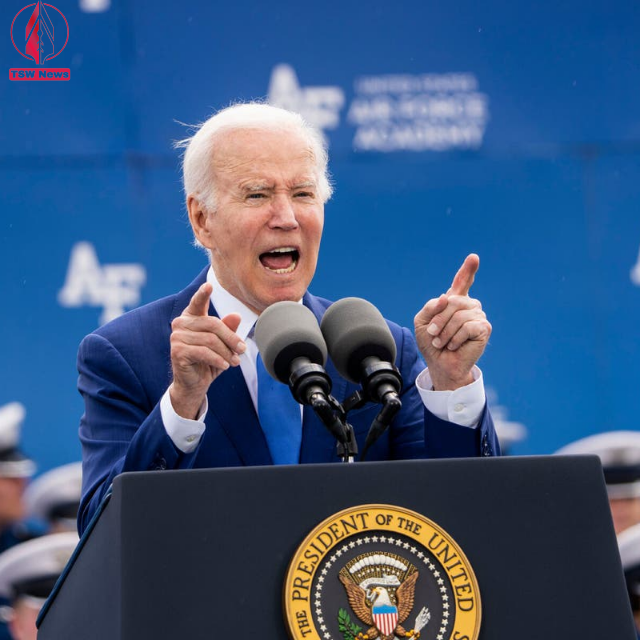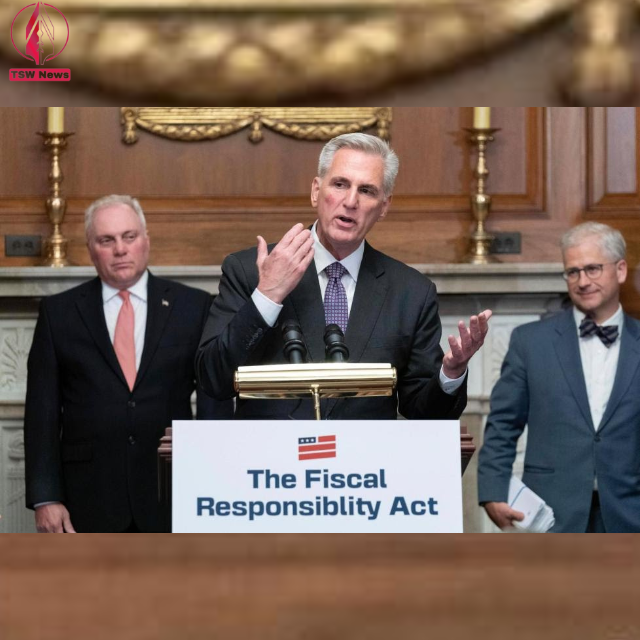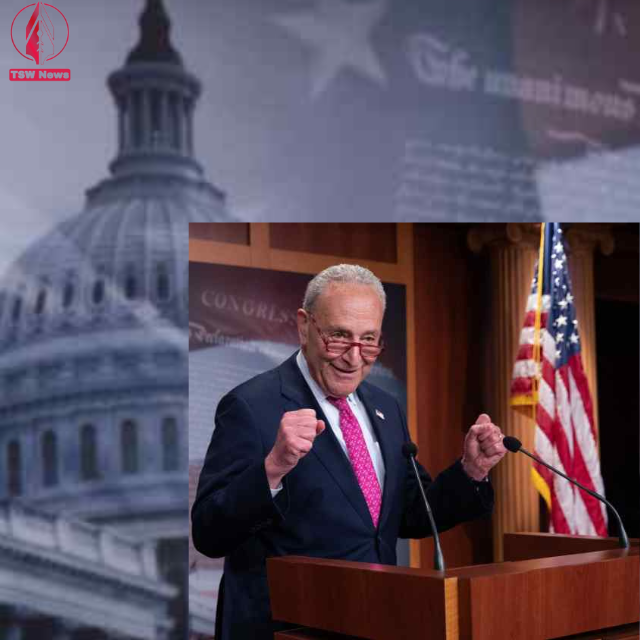Debt Ceiling Drama Ends: Senate Unites As Biden-McCarthy Agreement Passes With Overwhelming Vote
- Posted on June 2, 2023
- News
- By TSW NEWS DESK
- 198 Views

Bipartisan
Breakthrough: Senate Approves Historic Debt Ceiling and Budget Cuts Package
In a race against time, the US Senate granted final approval
on Thursday to a comprehensive debt ceiling and budget cuts package, working
late into the night to finalize the bipartisan agreement and send it to
President Joe Biden for it to become law before the imminent deadline.
While neither Republicans nor Democrats are completely
satisfied with the outcome of the compromise negotiated between Biden and House
Speaker Kevin McCarthy, the result marks a crucial resolution after weeks of
intense budget negotiations.
By shelving the volatile debt ceiling issue until 2025,
following the next presidential election, the US and global economies are
spared from potential turmoil.
House and
Senate Stand United: Biden-McCarthy Package Clears Major Hurdle
The Senate's bipartisan vote of 63-36 in favor of the bill
mirrored the overwhelming support it received in the House of Representatives
the day before, relying on the support of centrists from both parties to ensure
the passage of the Biden-McCarthy package.
Senate Majority Leader Chuck Schumer expressed relief at the bill's passage, stating that "America can breathe a sigh of relief" and that the nation has successfully averted a default.

Debt Limit
Dilemma: Washington Scrambles to Secure Funds and Prevent Financial Disaster
Taking swift action was crucial if Washington hoped to
meet the deadline on the following Monday when the Treasury warned that the US
would begin to face a shortage of funds to pay its bills, risking a
catastrophic default.
Raising the nation's debt limit, currently set at $31.4
trillion, would ensure that the Treasury could continue borrowing to cover the
existing US debts.
The Era of
Discord: McCarthy's Power Play in Congress Heightens Government Divide
Ultimately, the debt ceiling showdown in Congress was a
familiar high-stakes battle, with McCarthy leading the charge driven by a
conservative House Republican majority, creating a new era of divided
government in Washington as they confronted the Democratic president.
McCarthy refused to allow a routine vote to lift the
nation's debt limit without concessions, forcing Biden's White House into
negotiations to reach an agreement that included spending cutbacks aimed at
reducing the nation's deficits.
Breaking Down
the 99-Page Bill: Spending Cuts, Debt Ceiling Suspension, and Controversial
Policies
The comprehensive 99-page bill includes spending
restrictions for the next two years, suspends the debt ceiling until January
2025, and introduces certain policy changes.
These changes include implementing new work requirements
for older Americans receiving food aid and granting approval for the
Appalachian natural gas line, a move that many Democrats oppose.
Budget
Tug-of-War: Defense Gains, IRS Funds Trimmed in Controversial Bill
The bill increases funding for defense and veterans while
reducing new funds for Internal Revenue Service agents. It also rejects Biden's
proposal to roll back tax breaks on corporations and the wealthy, which were
implemented during the Trump administration, in an effort to help alleviate the
nation's deficits.
Additionally, the bill enforces automatic 1% spending cuts
if Congress fails to approve its annual spending bills.
McConnell's
Determination: Senate Leader Aims to Transform Budget Cuts into Law
Following the House's overwhelming approval of the package
on Wednesday, Senate Republican leader Mitch McConnell indicated his
determination to promptly secure its passage into law.
Highlighting the bill's budget cuts, McConnell stated on
Thursday, "The Senate has a chance to make that important progress a
reality."
In the Eleventh
Hour: Senators Challenge Package with Proposed Amendments
While several senators had remained largely on the
sidelines during the Biden-McCarthy negotiations, they insisted on debating
their proposed amendments to reshape the package.
However, making any changes at this late stage would
almost certainly derail the compromise, and none of the proposed amendments
were approved.
Senators
Unleash Their Votes: Conservative Republicans and Democrats Clash on Amendments
Consequently, the senators engaged in a series of
late-night votes, rejecting various amendments but making their preferences
clear. Conservative Republican senators aimed to further reduce spending, while
Democratic Senator Tim Kaine of Virginia sought to remove the approval for the
Mountain Valley Pipeline.
Energy Battle
in Congress: Manchin and Kaine Spar Over Pipeline Amendment
Senator Joe Manchin of West Virginia, who defended the
development of the energy pipeline, argued that the country cannot function
without the power generated from gas, coal, wind, and other available energy
sources.
Kaine, on the other hand, proposed an amendment to remove
the pipeline from the package, citing concerns about the project's
controversial nature and its impact on Appalachian lands that have been in
families for generations.
Ukraine Support
in Jeopardy: Senators Call for Increased Defense Spending
Senators who advocate for increased defense spending, led
by Lindsey Graham of South Carolina, expressed strong dissatisfaction, claiming
that the increased military funding in the deal is insufficient to keep up with
inflation.
They are particularly concerned about the need for
supplemental spending this summer to support Ukraine in its conflict with
Russian President Vladimir Putin.
Debt Ceiling
vs. National Security: Senators Debate Urgent Priorities
Graham argued from the Senate floor that "Putin's
invasion is a defining moment of the 21st century" and criticized the
House for its actions.
However, Schumer provided reassurance by reading an
agreement on the Senate floor, stating that the debt ceiling deal "does
nothing" to impede the Senate's ability to approve other emergency
supplemental funds for national security, including those for Ukraine, as well
as for disaster relief and other issues of national importance.
Skepticism and
Struggles: Negotiators Face Uphill Battle, McCarthy Under Pressure
Negotiators worked late into the night for weeks to reach
an agreement with the White House, while McCarthy spent days rallying support
among skeptical members of Congress.
Tensions ran high in the House the night before the vote
as hard-right Republicans rejected the deal. Some conservatives even hinted at
the possibility of attempting to remove McCarthy from his position.
Bipartisan
Victory: Biden and McCarthy Forge Alliance for Bill's Resounding Approval
However, Biden and McCarthy managed to build a bipartisan
coalition, resulting in the bill's robust approval with a vote of 314-117 in
the House.
Overall, 71 House Republicans broke ranks with McCarthy
and voted against the deal. McCarthy expressed satisfaction, stating, "We
did pretty dang good."
Mixed Feelings
on Spending Restrictions: McCarthy Calls Bill a First Step
While some Republicans expressed discontent with the
spending restrictions, arguing that they did not go far enough, McCarthy
considered the bill to be only a "first step."

Democrats Raise
Concerns: Work Requirements, Environmental Changes, and Pipeline Approval Face
Scrutiny
The White House immediately turned its attention to the
Senate, with senior staff members reaching out to individual senators to ensure
their support.
Democrats also voiced their concerns, particularly
regarding the new work requirements for older Americans, the changes to the
National Environmental Policy Act, and the approval of the controversial
Mountain Valley Pipeline, which they believe hinders efforts to combat climate
change.
Spending
Restrictions Aimed at Deficit Reduction: CBO Highlights $1.5 Trillion Potential
Savings
According to the nonpartisan Congressional Budget Office
(CBO), the spending restrictions in the package would reduce deficits by $1.5
trillion over the next decade, a significant goal for Republicans aiming to
curb the nation's debt burden.
However, the CBO also revealed an unexpected complication:
their analysis indicated that the Republicans' push to impose work requirements
on older Americans receiving food stamps would increase spending by $2.1
billion over the same period.
It is because the final deal exempts veterans and homeless
individuals from the work requirements, increasing the number of people
eligible for food stamps by 78,000 per month, as stated by the CBO.
For more updates
keep visiting our website www.topstoriesworld.com where we provide unbiased, true and top
stories of the world.




